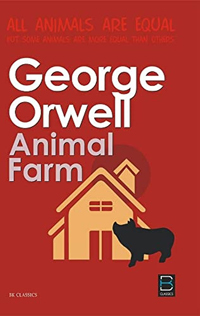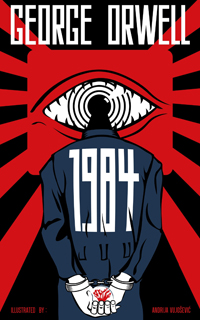 George Orwell is well known, primarily for two novels which have enjoyed remarkable success. Many youngsters have enjoyed the animal fable of Animal Farm without realising that they are reading a closely observed satire on the political development of the Soviet Union under Stalin. Every event in the novel is a careful parallel with a corresponding event in the Russian revolution and its aftermath, particularly the rivalry between Stalin and Trotsky. Napoleon and Snowball, the windmill, the dogs – they are all there. Young readers, or viewers of the cartoon version, will also be unaware of the difficulty Orwell had in getting it published towards the end of the Second World War because of political sensitivities – the USSR had been a key ally in the war.
George Orwell is well known, primarily for two novels which have enjoyed remarkable success. Many youngsters have enjoyed the animal fable of Animal Farm without realising that they are reading a closely observed satire on the political development of the Soviet Union under Stalin. Every event in the novel is a careful parallel with a corresponding event in the Russian revolution and its aftermath, particularly the rivalry between Stalin and Trotsky. Napoleon and Snowball, the windmill, the dogs – they are all there. Young readers, or viewers of the cartoon version, will also be unaware of the difficulty Orwell had in getting it published towards the end of the Second World War because of political sensitivities – the USSR had been a key ally in the war.
This video from the Orwell Foundation explores some of the political and personal challenges of its writing and publication:
The Hidden Wife
That film touches on Orwell’s wife, Eileen. Back in March we considered Zelda Fitzgerald and Eileen Blair’s case has similarities. A highly educated woman herself, studying English at Oxford before gaining a Master’s degree in educational psychology, she was involved like her husband in the Spanish Civil War and worked in the Ministry of Information during the Second World War. She had a significant influence of George’s writing, but died during a medical operation months before Animal Farm was published.
Her role in Orwell’s work has been meticulously researched and recreated in a new book by Anna Funder, called Wifedom. It is not a conventional biography, but a ‘quasi-novelistic portrait… putting story to the service of fiction’ according to Robert McCrum in this revealing review.
Totalitarian States
 Animal Farm amply demonstrated Orwell’s condemnation of dictatorship, totalitarianism and the mind- control of a population. These ideas were taken further and in a much starker form in his most successful novel, 1984, which may have taken its title from one of Eileen Blair’s poems.
Animal Farm amply demonstrated Orwell’s condemnation of dictatorship, totalitarianism and the mind- control of a population. These ideas were taken further and in a much starker form in his most successful novel, 1984, which may have taken its title from one of Eileen Blair’s poems.
It is not only a ferocious attack on totalitarianism and the manipulation of the population, but clearly sees how warfare is used cynically to create a common enemy to pull people together, busying ‘giddy minds/ With foreign quarrels’ in the words of Shakespeare’s Henry IV. As the Ministry of Truth states, ‘War is Peace’. The novel has also given us vocabulary like ‘Big Brother’, ‘doublethink’ and ‘Newspeak’.
We are now long past the year 1984, but we still see all around us the issues that Orwell wrote about, and not necessarily only in regimes which are considered totalitarian like North Korea. Look at the use of the media to feed propaganda to the population in Russia and its rewriting of history books to justify the invasion of Ukraine – straight out of 1984. But attempts to reorganise the past and to establish falsehoods as fact – or alternative truths – are clear in the West as well. Read this illuminating article on the continuing influence of Orwell’s novel and its ideas.
Are Lyrics Poetry?
 Back in July I raised the issue of literary snobbery, admitting that I hadn’t read Bridget Jones’ Diary. Now it’s time to admit I am not a habitual listener to the musical works of Drake. But there was consternation in 2016 when Bob Dylan won the Nobel Prize for Literature. However, his work s a poet lyricist is now acknowledged and I have read A Level essays on his published lyrics. So why not Drake?
Back in July I raised the issue of literary snobbery, admitting that I hadn’t read Bridget Jones’ Diary. Now it’s time to admit I am not a habitual listener to the musical works of Drake. But there was consternation in 2016 when Bob Dylan won the Nobel Prize for Literature. However, his work s a poet lyricist is now acknowledged and I have read A Level essays on his published lyrics. So why not Drake?
This article explains why not – because random collections of sentences and words are not poetry. As well as a pretty damning account of Drake’s poems, Isabella Oliver also takes a swipe at the phenomenon of Instapoetry, including, by implication, the hugely popular and successful work of Rupi Kaur, about whose verse I have also read a lot of coursework. Is Oliver right?